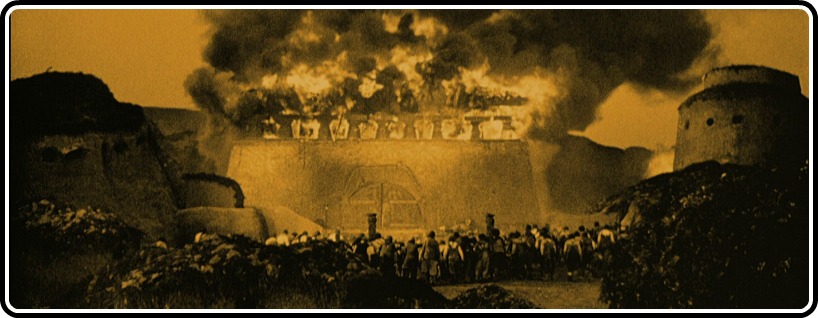
Particularly in his silent years, Fritz Lang was not a man known for his brevity. His most famous film from that (or arguably any) era, Metropolis, originally ran a little over two and a half hours long. His two-part serial, The Spiders, runs nearly that. Another serial, Spies, is nearly three hours long. His smash hit, Dr. Mabuse, the Gambler, is a whopping four hours. And yet, still there remains another, even longer, even more epic achievement – the two-part, five-hour Die Nibelungen.
Based on the epic poem Nibelungenlied, which bears no official authorship, and adapted for the screen by Lang and his then-wife Thea von Harbou, the film tells an arc familiar to those who have read even a small amount of fantasy literature from the Middle Ages – a hero rises through the ranks to obtain power through strength and cunning, only to be done in by his own arrogance. The title refers to a treasure that our hero, Siegfried, ruthlessly steals from a band of dwarves, whose last dying gesture is to curse the treasure. It’s a clever narrative tack, as it allows those who wish to refute the true theme of the story, which begins as a treatise on greed and the desire for power, before warping that into a revenge tale, to see merely the story of a curse, while still imparting the depth inherent to that central truth.
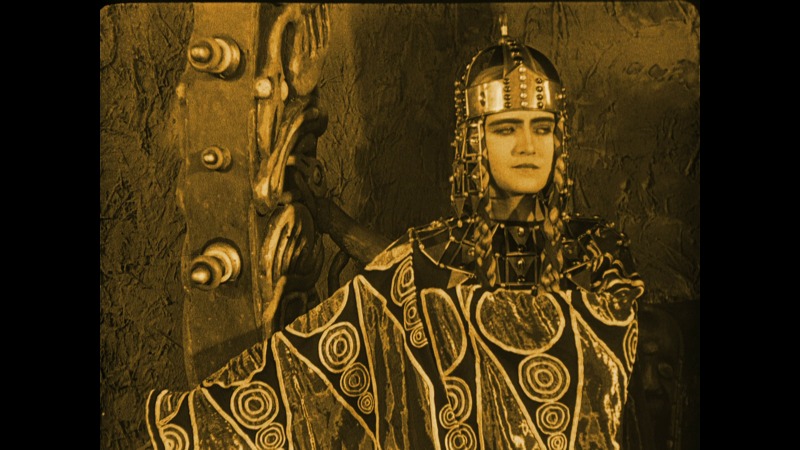
I’m far from the most receptive audience to these sorts of fantasy/kings-and-queens/power-struggle sagas, and Die Nibelungen certainly has its share of epic bloviating, but as always, Lang still brings the cinema. Reserving the charged blasts of energy that would define his post-1930 work for the incredible battle scenes (a castle siege in part two rivals the Battle at Helm’s Deep), he takes a more patient tack, wallowing in the sets, costuming, and tone. This makes for a longer film, certainly, but rather than one bogged down in the endless exposition of a modern blockbuster, this makes a rather simple story truly epic. I’d be lying if I said the five hours simply flew by, but nor did they feel unwarranted. It’s a real study in long form storytelling, the kind that suspends any sort of payoff for hours, but when it comes, it comes all the harder.
Masters of Cinema’s new Region-B Blu-ray release of the film, transferred from a new restoration by Friedrich-Wilhelm-Murnau-Stiftung, is a study in “considering…”. The transfer really does look magnificent, considering…the film is nearly ninety years old. It’s a little soft in places and exhibits damage throughout, but I’d be shocked to hear of anyone familiar with the perils of film preservation who’s disappointed by this. It’s really quite striking, film-like, smooth, and robust. The only special feature on the disc – an hour-long documentary – discusses the slow, sometimes accidental process by which the film was assembled, disassembled, and haphazardly rebuilt before a concerted effort was put forth. As always, the great irony of immensely popular films is that they end up being the most difficult to restore, so quickly were the elements sliced and diced, discarded, and casually run through projectors without a thought that a single theater could be holding an element not found in any other print. So while some spots in this new restoration are dicier than others, on the whole, I’m more than happy to take here what we can get. The film is presented in its original aspect ratio, 1.37:1.
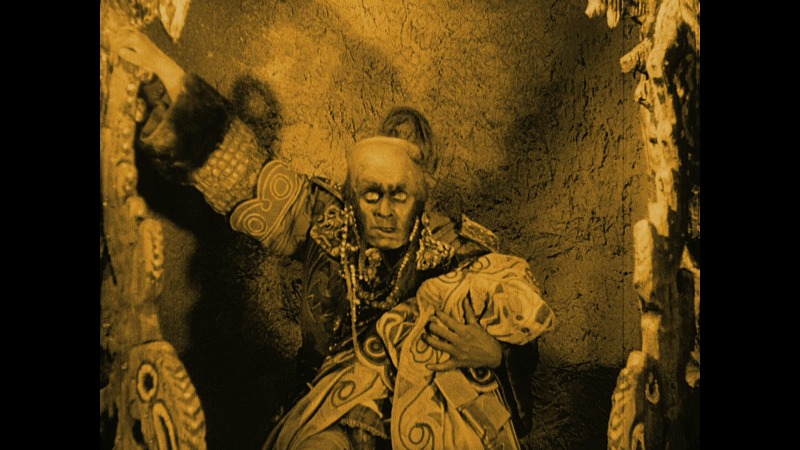
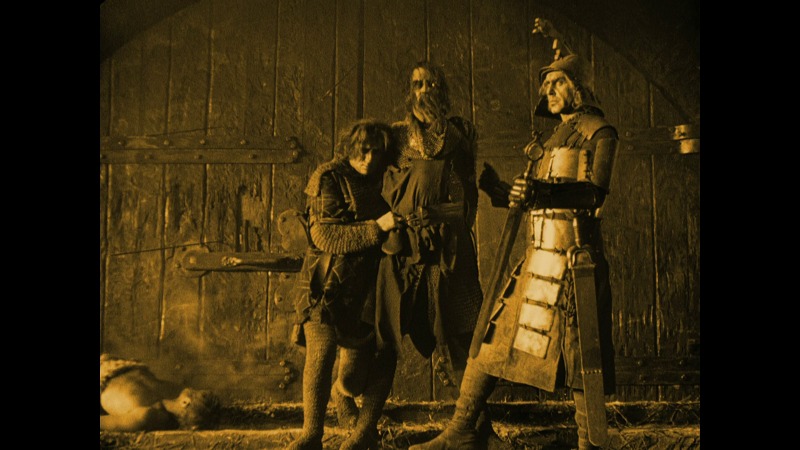
Subtitles are, naturally, present to translate the German intertitles, most of which came from prints, but a few were produced by FWMS, and are noted with those four letters in the lower-lefthand side. It’s a nice touch, I suppose, but they so perfectly reproduce the design and texture of the original intertitles that it seemed only necessary to hardcore scholars, and distract somewhat from the experience of the film itself.
On the audio side, we get a lossless transfer of Gottfried Hupperz’s score, which is occasionally a little too precise for my taste – we get the *CLANG* *CLANG* *CLANG* when Siegfried slams his hammer into a sword he’s making, but rarely any other diegetic effects – but on the whole is as striking and grand as the film it accompanies.
The only special feature on the disc is the aforementioned documentary, which contains a vast array of information somewhat sloppily presented (rough or no transitions between topics, withholding context in some arenas), but is well worth watching after seeing the film. It goes through the whole process of making and releasing the film, then the life it led until FWMS grabbed hold of it for their restoration. They also include some clips from other German films of the period, many of which don’t get the same play as a Dr. Mabuse, the Gambler or Nosferatu, so it’s really cool to see what else was going on in Germany at the time.
And finally, there’s MoC’s customarily lavish, almost-worth-the-price-on-its-own booklet. This one has 56 pages chock-full of background information and scholarly essays. A brief overview shows an essay by Lotta H. Eisner, excerpted from her 1976 study of his work; an excerpt from Tom Gunning’s biography of Lang; Lang’s own feelings towards Die Nibelungen over the years; a quick note by Michael Powell on the influence of Lang; a poem by Geoffrey O’Brien; and finally, a note on the tinting of the film, which breaks down the research that went into their final decision, and the process the used to attain it. It’s really quite something.
Buy the Blu-ray from Amazon.co.uk


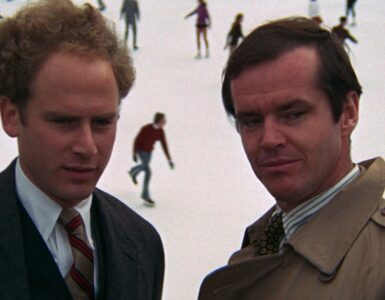

![Bergman Island (The Criterion Collection) [Blu-ray]](https://criterioncast.com/wp-content/uploads/2022/11/bergman-island-the-criterion-collection-blu-ray-400x496.jpg)
![This Is Not a Burial, It’s a Resurrection (The Criterion Collection) [Blu-ray]](https://criterioncast.com/wp-content/uploads/2022/11/this-is-not-a-burial-its-a-resurrection-the-criterion-collection-blu-ray-400x496.jpg)
![Lars von Trier's Europe Trilogy (The Criterion Collection) [The Element of Crime/Epidemic/Europa] [Blu-ray]](https://criterioncast.com/wp-content/uploads/2022/11/lars-von-triers-europe-trilogy-the-criterion-collection-the-element-of-400x496.jpg)
![Imitation of Life (The Criterion Collection) [Blu-ray]](https://criterioncast.com/wp-content/uploads/2022/11/imitation-of-life-the-criterion-collection-blu-ray-400x496.jpg)
![The Adventures of Baron Munchausen (The Criterion Collection) [4K UHD]](https://criterioncast.com/wp-content/uploads/2022/11/the-adventures-of-baron-munchausen-the-criterion-collection-4k-uhd-400x496.jpg)
![Cooley High [Criterion Collection] [Blu-ray] [1975]](https://criterioncast.com/wp-content/uploads/2022/11/cooley-high-criterion-collection-blu-ray-1975-400x496.jpg)